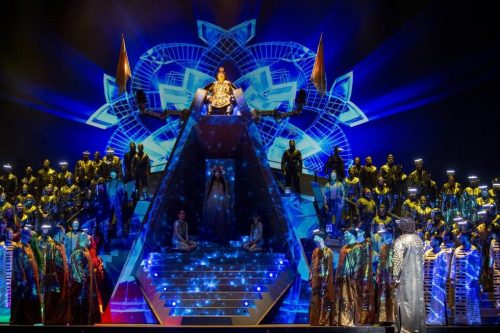 Spain Puccini, Turandot: Liceu Chorus and Orchestra / Josep Pons (conductor), Gran Teatre del Liceu, Barcelona, 7 & 8.10.2019. (JMI)
Spain Puccini, Turandot: Liceu Chorus and Orchestra / Josep Pons (conductor), Gran Teatre del Liceu, Barcelona, 7 & 8.10.2019. (JMI)

Production:
Director – Franc Aleu
Stage co-director – Susana Gómez
Sets – Carles Berga & Franc Aleu
Costumes – Chu Uroz
Lighting – Marco Filibeck
Casts:
Turandot – Iréne Theorin/Lise Lindstrom
Calaf – Jorge de León/Gregory Kunde
Liù – Ermonela Jaho/Anita Hartig
Timur – Alexander Vinogradov/Ante Jerkunica
Ping – Toni Marsol
Pang – Francisco Vas
Pong – Mikeldi Atxalandabaso
Mandarin – Michael Borth
Altoum – Chris Merritt
The Liceu’s opera season has just opened with a new production of Turandot, the opera with which the theater reopened twenty years ago after a dreadful fire. On this occasion, the Liceu turned to Franc Aleu, who has often collaborated with La Fura dels Baus on the video projections which are so prevalent in the works of this Catalan group. As one might expect, video plays a big part in this new staging, especially in the first part of the opera.
The set is basically the same for the entire opera: a large pyramid with staircases on the sides, sitting on a revolving platform and crowned with an elevated throne where Emperor Altoum sits. The costumes could be considered as somewhat futuristic – not the traditional Chinese garb – and the production overall is very dark to facilitate the video projections. Aesthetically, it works, though the fact that the chorus and extras wear lamps on their heads can be rather annoying for the audience.
The stage direction by Franc Aleu and Susana Gómez narrates the plot properly. There are no re-readings, except for the fact that Liù electrocutes herself. It is not a happy ending, but Turandot ends up tenderly embracing Liù’s body, while Calaf regrets that he has lost the Ice Princess. It is a more modern interpretation, but that has little effect here on the opera and the music that bring such joy.
Josep Pons, the Liceu’s music director, delivered a satisfying reading. The first night, there was some excess sound in Act I, but soon everything moderated, and the singers had no trouble reaching the audience. I enjoyed his conducting the following day even more. The orchestra was very good – they have improved significantly in recent years under the baton of Mr. Pons. The chorus was also much better than on some previous occasions.
Turandot was sung in the first cast by soprano Iréne Theorin, whose voice is perfectly suited to the role. She is a noteworthy singer and actress, but her usual problem was evident here: her highest notes are most often shouted. The second Turandot was sung by Lise Lindstrom, who has been a frequent interpreter of the character in recent years. I have seen her play the part several times, and she is always convincing. Although the middle range of her voice seems too metallic, she has no problems with the top notes.
On the first night, Calaf was played by tenor Jorge de León, who did well. His voice responds nicely to the demands of the part, although his singing can be a little monotonous. The always highly anticipated ‘Nessun dorma’ was impressive. As on previous occasions, he avoided the optional high C at the end the second act; and there is a certain excess of vibrato in his middle range. The second Calaf was Gregory Kunde, who was marvelous in every way. He has a beautiful voice and sang with elegance and expressiveness. His arias were exemplary and, unlike some of his colleagues, he did not avoid that high C.
Vocally, the best singer on the first night was soprano Ermonela Jaho in the part of Liù. Her two arias were perfectly rendered with exquisite taste and beautiful pianissimos. It was an outstanding performance. Anita Hartig too was remarkable in the two arias, and successful at conveying emotion. Vocally, she was not quite as bright as Ermonela Jaho, but she was a superb Liù.
Alexander Vinogradov was a good Timur, although he had some problems projecting his voice in the first act. Ante Jerkunica as the second Timur had an attractive voice and gave a fine performance. The Three Ministers, Ping, Pang and Pong – sung by Toni Marsol, Francisco Vas and Mikeldi Atxalandabaso – were also correct in their roles, as was Michael Borth as the Mandarin.
Finally, there was the great Rossini tenor, Chris Merritt, who was a convincing Emperor Altoum. What memories his presence awakens!
José M. Irurzun
